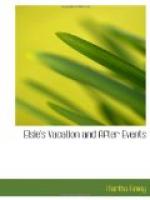“The night before this battle of Princeton he and his army were in a critical situation, the British being fully equal in numbers and their troops well disciplined, while about half of Washington’s army was composed of raw militia—so that a general engagement the next day would be almost sure to result in defeat to the Americans.
“Washington called a council of war. It was he himself who proposed to withdraw from their present position—on the high ground upon the southern bank of the Assanpink—before dawn of the next morning, and, by a circuitous march to Princeton, get in the rear of the enemy, attack them at that place, and if successful march on to New Brunswick and take or destroy his stores there.
“The great difficulty in the way was that the ground was too soft, from a thaw, to make it safe and easy to move their forty pieces of cannon.
“But a kind Providence removed that hindrance, the weather suddenly becoming so extremely cold that in two hours or less the roads were hard enough for the work.”
“As Lossing says,” remarked Grandma Elsie, “’The great difficulty was overcome by a power mightier than that of man. Our fathers were fighting for God-given rights and it was by his help they at last succeeded.’”
“What’s the rest of the story?” asked Walter. “How did Washington and his army slip away without the British seeing them? For I suppose they had sentinels awake and out.”
“Washington had a number of camp fires lighted along his front,” replied Harold, to whom the question seemed to be addressed, “making them of the fences near at hand. That made the British think he was encamped for the night, and Cornwallis, when some one urged him to make an attack that night, said he would certainly ‘catch the fox in the morning.’ The fox, of course, was Washington, but he didn’t catch him. It was not till dawn he discovered that the fox had eluded him and slipped away, fleeing so silently that the British did not know in what direction he had gone till they heard the boom of the cannon in the fight here.
“Cornwallis thought it was thunder, but Sir William Erskine recognized it as what it was and exclaimed, ’To arms, General! Washington has outgeneraled us. Let us fly to the rescue at Princeton.’”
“How long did the battle last?” queried Walter.
“The fight right here lasted about fifteen minutes, but was very severe,” replied his brother. “Then Washington pushed on to Princeton, and in a ravine near the college had another sharp fight with the Fifty-fifth British regiment.”
“And whipped them too?”
“Yes; they were soon flying toward Brunswick, the Fortieth regiment going along with them.
“A part of a regiment was still in the college buildings, and Washington had some cannon placed in proper position, then began firing on them. One of the balls—it is said to have been the first—passed into the chapel and through the head of a portrait of George the Second that hung in a large frame on the wall. A few more shots were fired, and then the Princeton militia, and some other daring fellows, burst open a door of Nassau Hall and called upon the troops there to surrender, which they did promptly.”




